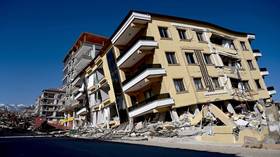Seismologist behind Türkiye quake prediction issues new warning

Dutch seismologist Frank Hoogerbeets, who rose to international prominence after predicting the devastating earthquakes in Türkiye and Syria last month, has said that the world could be hit with another major quake in the coming days.
Hoogerbeets, who makes his forecasts based on the motions of celestial bodies, published a video on YouTube on Monday in which he warned that “the first week of March is going to be extremely critical.”
“A convergence of critical planetary geometry around March 2 and 5 may result in large to very large seismic activity, possibly even a mega-thrust earthquake around March 3 and 4 and/or March 6 and 7,” the description to the clip read.
In the video itself, the seismologist claimed that the power of the supposed impending quake “may be well over 8 magnitude.”
The affected area could stretch thousands of kilometers, from the Kamchatka Peninsula and the Kuril Islands in Russia’s Far East, all the way down to the Philippines and Indonesia, Hoogerbeets said.
“I’m not exaggerating. I’m not trying to create fear. This is a warning,” insisted the scientist, who works at the Solar System Geometry Survey (SSGEOS).
The head of the Kamchatka branch of the Geophysical Survey of Russia’s Academy of Sciences, Danila Chebrov, has questioned Hoogerbeets’ predictions and described him as an “amateur.” The connection between the movements of the planets in the solar system and seismic activity on Earth “is rather weak, and it’s problematic to use it as the main prognostic tool,” Chebrov explained.
On February 3, Hoogerbeets issued a tweet that read: “Sooner or later there will be a magnitude 7.5 earthquake in this region (South-Central Turkey, Jordan, Syria, Lebanon).”
Three days later, a 7.8 magnitude quake struck Türkiye and Syria. The disaster has caused the deaths of more than 50,000 people, with powerful aftershocks continuing in the region to this day.
Dutch seismologist Hoogerbeets has made predictions down the years which didn’t come true. Commenting on his work earlier this month, Susan Hough of the US Geological Survey insisted that no scientist has “ever predicted a major earthquake.” Hough told NPR that the spot-on forecast for the quakes in Türkiye and Syria was just a coincidence. “It’s the stopped clock that’s right twice a day, basically,” she said.













